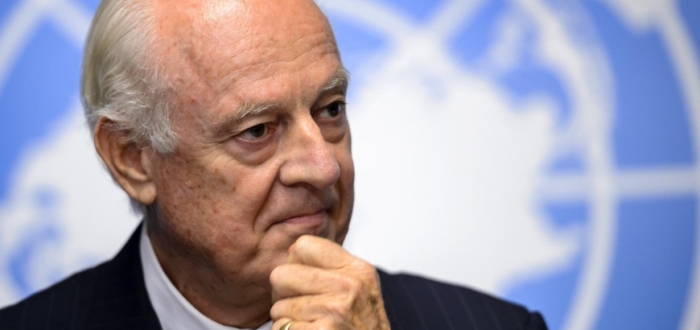The UN envoy to Syria, Staffan de Mistura, announced Monday that talks between the Syrian opposition and Bashar al-Assad’s regime will begin in Geneva on Friday. De Mistura said there will be no preconditions for commencing the talks, indicating he had rejected the conditions demanded by the opposition delegation which emerged from the Riyadh conference, most prominently stopping bombardment before negotiations can begin.
Mystery prevailed over the responses of the international envoy to the questions regarding who will be invited to the talks, and who will represent the opposition. Analysts said his silence about the arrangement of the opposition delegation is natural because his attempts to intervene in the arrangement of the delegation are ongoing, rejecting – along with Moscow – that the opposition delegation emerging from the Riyadh conference be the negotiating delegation.
De Mistura’s comments strongly emphasized the need to involve civil society organizations and women in Geneva, which the Syrian opposition considered another attempt to infiltrate its delegation, especially as the envoy has been vague about the size and nature of their participation, saying only that “it needs consultation.”
It appears that de Mistura was previously preparing an alternative plan if the gates were shut on his attempts to change the opposition delegation, through playing the chord of “the need to empower and involve civil society organizations and women in the negotiations.” Trusted sources familiar with de Mistura’s movements told Al-Souria Net that the envoy began communicating with these groups at the beginning of his work as envoy to solve the Syria issue, but not enough light has been shed on these contacts on the part of the envoy or on the part of the organizations.
A number of civil society organizations (largely in Syria) have repeatedly sent messages to de Mistura after international civil society and UN bodies provided a line of communication between Syrian organizations and the UN envoy.
The sources said that the issue is not related to the participation or non-participation of these organizations, but it is necessary to look at the orientation their work is built upon and their position on what is happening in Syria. The sources, who asked not to be identified because of the sensitivity of their position, said that “some of these organizations put demands related to feminist mobilization and female representation at the top of their priorities, and do not necessarily adopt the opposition demand represented first by changing the Assad regime, in an attempt to distance themselves from the conflict and place themselves at the same distance from the regime and the opposition. They are satisfied with demands to reform some of the unfair laws currently enforced by the regime, and this means distancing them from the opposition delegation as long as they are going with a different view and level of demands.”
They said some of the personalities whose names have been proposed to attend the talks belong to some of these organizations, which still work inside Syria in areas controlled by the regime, adding they will leave the country to attend meetings and return in full view of Syrian intelligence without experiencing any interrogation, at a time when the regime arrests anyone it suspects of opposing it, with many dying under torture.
For example, the Women’s International League for Peace and Freedom, which receives support from governments and the United Nations, demands “empowering women’s civil society organizations in Syria in the Geneva talks.” In a message on January 20, the organization called on the United Nations and the international mediator to empower “women’s groups in Syria to influence the peace process,” and kept its demands free of any reference to the Assad regime, including the killings it is carrying out and its role in the future of Syria, and focused on the need for Syrian women to be represented at the negotiating table. It seems that the goal of this broadening of the Syrian opposition’s demands from the need to get rid of Assad and stop bombardment to the need to represent and empower women could affect the performance and demands of the opposition delegation.
It seems that the UN envoy aims for the attendance of representatives from civil society groups and some women to be a “balance” to affect the decisions and guide the work of the opposition delegations. This thinking dominated de Mistura’s thinking in the plan he presented to the Security Council, which includes the formation of four working groups.
The Syrian opposition is suspicious of de Mistura’s insistence on including representatives from civil society organizations, in that these groups’ role was completely absent under Assad’s rule, and it is known that a short time before the start of the revolution these organizations were differentiated into non-government organizations, half of which were religious and were banned from working outside of this context, and others which were linked to influential people in the Assad regime and were monitored by security agencies. Heads of civil society groups which seriously tried to create change in Syrian society were arrested by the regime.
The sources said that the proposed plan to involve representatives from civil society groups and focus on the need for women’s participation came from de Mistura’s view that these bodies are more “amenable” to the ideas that will be presented during the talks, and that he can resort to these groups in the event that political and military opposition representatives appear stubborn in the direction of some material issues.
This article was translated and edited by The Syrian Observer. Responsibility for the information and views set out in this article lies entirely with the author.


